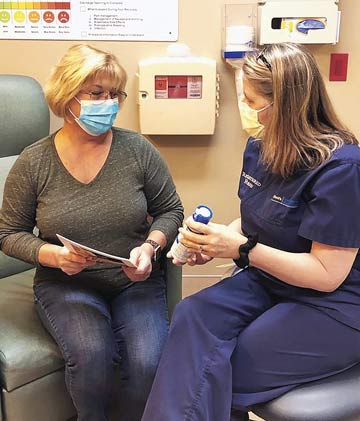Recommending that patients fast after midnight the night before their procedures has been traditional practice for decades, says TJ Gan, MD, MBA, MHS, FRCA, a professor and chairman of the department of anesthesiology at Stony Brook (N.Y.)
Renaissance School of Medicine. "There had been concern about patients aspirating while they were under anesthesia," he explains. "There wasn't a lot of evidence supporting this risk, but providers typically erred on the side of caution.
"Having patients drink clear liquids — such as water, apple juice or sports drinks — up to two hours preoperatively is compatible with the ASA's guidelines," says Dr. Gan.
Research now shows that patients who down pre-surgery complex-carbohydrate drinks don't feel thirsty and remain hydrated, meaning they're more comfortable heading into their procedures. The drinks also help control perioperative glucose levels.
"Patients should drink at least 50g of maltodextrin reconstituted in a clear liquid or a pre-surgery complex-carbohydrate drink up to two hours before surgery to be more prepared to endure the physical demands of the procedure," says Dr.
Gan.
More recently, studies have been conducted to determine how quickly liquids and solids empty from the stomach. Dr. Gan says that in many circumstances, giving patients clear fluids prior to surgery stimulates gastric contraction and therefore
gastric emptying, even in overweight patients.
Medications used during the induction of anesthesia cause vasodilation, which results in a lowering of a patient's blood pressure. Patients who have been NPO for prolonged periods become dehydrated and hypovolemic."Induction medications can
potentially exacerbate hypovolemia, leading to a lower-than-expected blood pressure," says Robert W. Simon, DNP, CRNA, CHSE, CNE, chief CRNA at Huntington Valley Anesthesia Associates and the assistant program director/didactic education
coordinator at the Frank J. Tornetta School of Anesthesia. "Preoperative hydration, either in intravenous form or clear liquids taken orally, can help mitigate this effect."
Dr. Gan points out that evidence also suggests pre-surgery complex-carbohydrate drinks lower the risk of PONV and drowsiness, thereby improving how quickly patients recover from surgery and their overall satisfaction. He says the cost of the
drinks and logistics involved in getting them to patients before surgery are typically limiting factors. "Some patients may not go to their pre-op screenings, or these screenings may be virtual due to the COVID-19 pandemic, so patients
aren't receiving the drinks," says Dr. Gan.
The expense of treating a patient with severe PONV is costly, making pre-surgery complex-carbohydrate drinks a worthy investment. PONV occurs in up to 30% of patients, and while the cost of treating PONV has decreased due to the availability
of more affordable antiemetics, a recent study published in the journal Best Practice & Research: Clinical Anaesthesiology shows that limiting PONV can financially benefit a facility because it is associated with shorter post-op
stays as well as decreased supply costs and staffing burden (osmag.net/35M5nLG).
Dr. Gan notes that in terms of improving blood glucose control, insulin-dependent diabetic patients may not see much benefit in pre-surgery complex-carbohydrate drinks. Additionally, the drinks are not typically recommended for children unless
they're specifically formulated for pediatric patients. "Kids, depending on their age and overall health, have different metabolic requirements compared with adults," says Dr. Simon. "Recent research has supported a decrease in NPO times
for both children and adults with some pediatric facilities encouraging clear liquids preoperatively," says Dr. Gan.
Current evidence supports revising preoperative fasting requirements for healthy patients. Guidelines are often institution-based as well, so some facilities may have specific NPO practices in place. "Unfortunately, it's not a one-size-fits-all
solution as each patient may have different metabolic needs or conditions," says. Dr. Simon.
.svg?sfvrsn=be606e78_3)

.svg?sfvrsn=56b2f850_5)